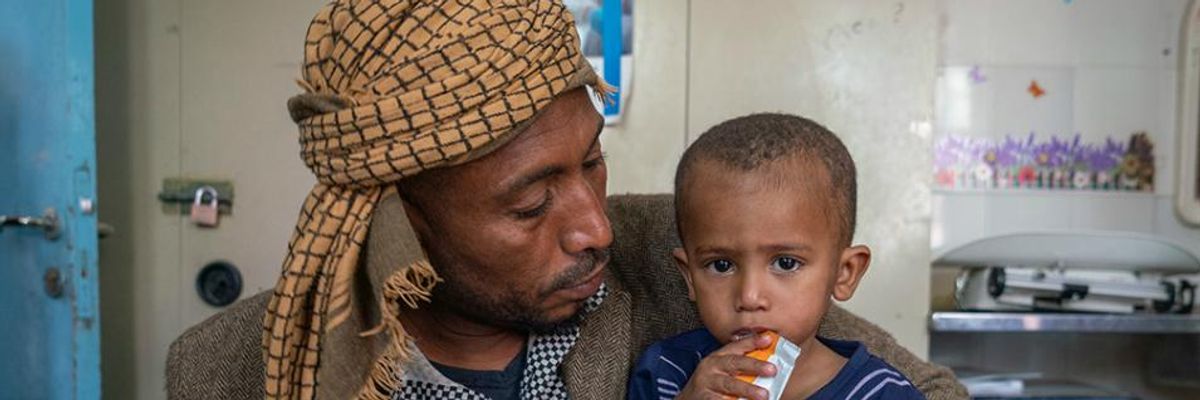The 2020 Nobel Peace Prize was awarded to the United Nations' World Food Programme early Friday morning, with the honor given in recognition of the international organization's "efforts to combat hunger, for its contribution to bettering conditions for peace in conflict-affected areas, and for acting as a driving force in efforts to prevent the use of hunger as a weapon of war and conflict."
In response, the WFP's executive director David Beasley said the award was "humbling, moving recognition" for its international staff "who lay their lives on the line every day to bring food and assistance for close to 100 million hungry children, women, and men across the world. People whose lives are often brutally torn apart by instability, insecurity, and conflict."
Announcing the award, the Nobel Committee said that amidst multi-layered global crises--namely ongoing war and conflicts, acute poverty, and the ravages of the Covid-19 pandemic--the focused work of the WFP to battle starvation and promote food security was more important than it has ever been. According to the Committee:
The world is in danger of experiencing a hunger crisis of inconceivable proportions if the World Food Programme and other food assistance organizations do not receive the financial support they have requested.
The link between hunger and armed conflict is a vicious circle: war and conflict can cause food insecurity and hunger, just as hunger and food insecurity can cause latent conflicts to flare up and trigger the use of violence. We will never achieve the goal of zero hunger unless we also put an end to war and armed conflict.
While emphasizing that humanitarian efforts to end hunger and increase food security is also the work of curtailing war and conflict, the Nobel Committee said it hopes this year's prize will help "turn the eyes of the world towards the millions of people who suffer from or face the threat of hunger. The World Food Programme plays a key role in multilateral cooperation on making food security an instrument of peace, and has made a strong contribution towards mobilizing UN Member States to combat the use of hunger as a weapon of war and conflict."
Beasley said that the work of the WFP is not done alone--as it works with governments, local communities, and organizations worldwide to fulfill its mission--and therefore the award cannot belong to just one organization.
"Every one of the 690 million hungry people in the world today has the right to live peacefully and without hunger," Beasley said in his statement. "Today, the Norwegian Nobel Committee has turned the global spotlight on them and on the devastating consequences of conflict. Climate shocks and economic pressures have further compounded their plight. And now, a global pandemic with its brutal impact on economies and communities, is pushing millions more to the brink of starvation."
Anti-war activist applauded WFP for receiving the honor and said they hoped it would have its desired impact by highlighting the destruction caused by war, especially conflicts bolstered by the nation with the world's largest and most powerful military, the United States:
As did the Nobel Committee, Beasley emphasized the interlocking dynamic between people having enough to eat and the prospects of a more peaceful world.
"Where there is conflict, there is hunger. And where there is hunger, there is often conflict," he said. "Today is a reminder that food security, peace, and stability go together. Without peace, we cannot achieve our global goal of zero hunger; and while there is hunger, we will never have a peaceful world."




